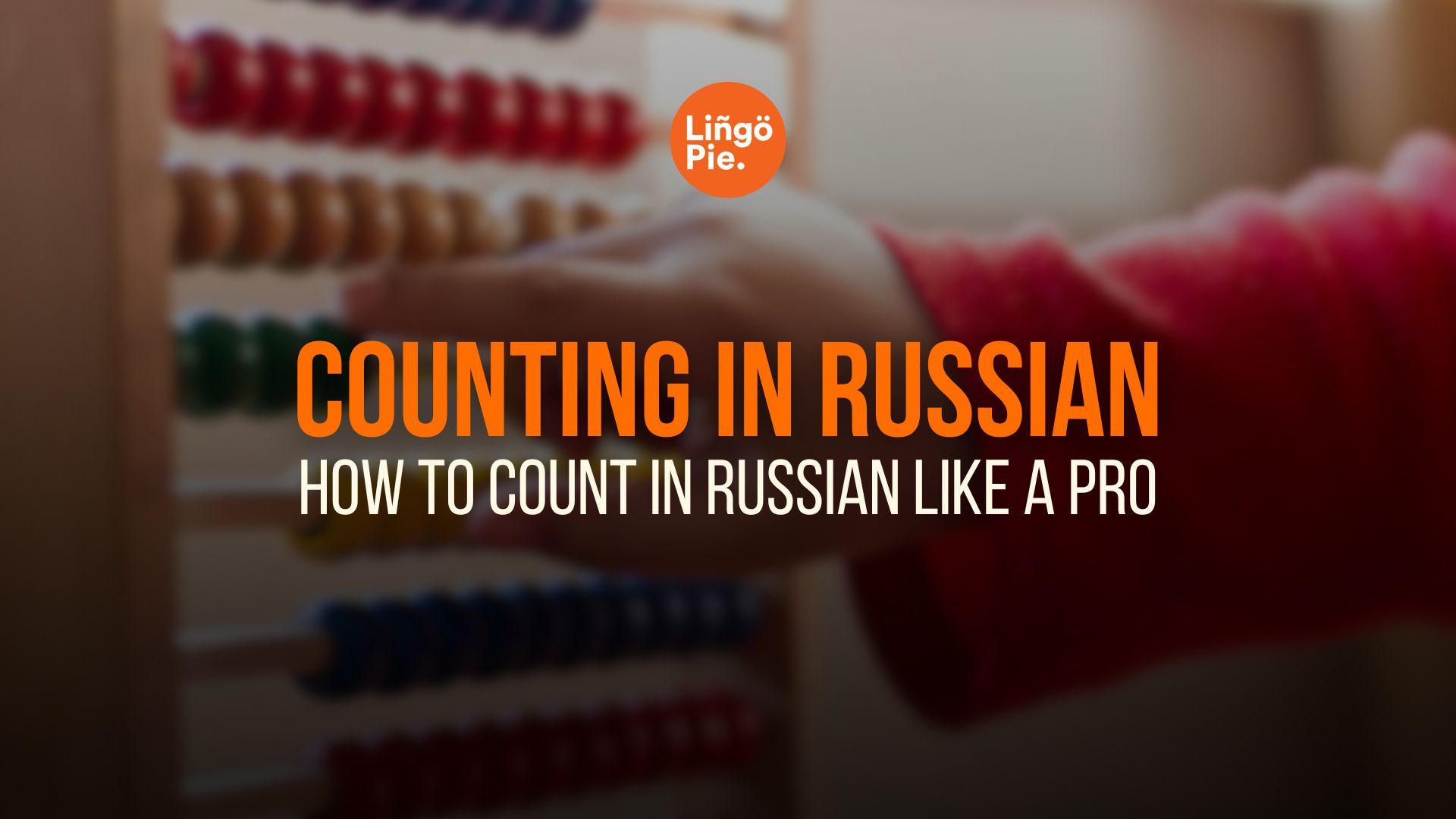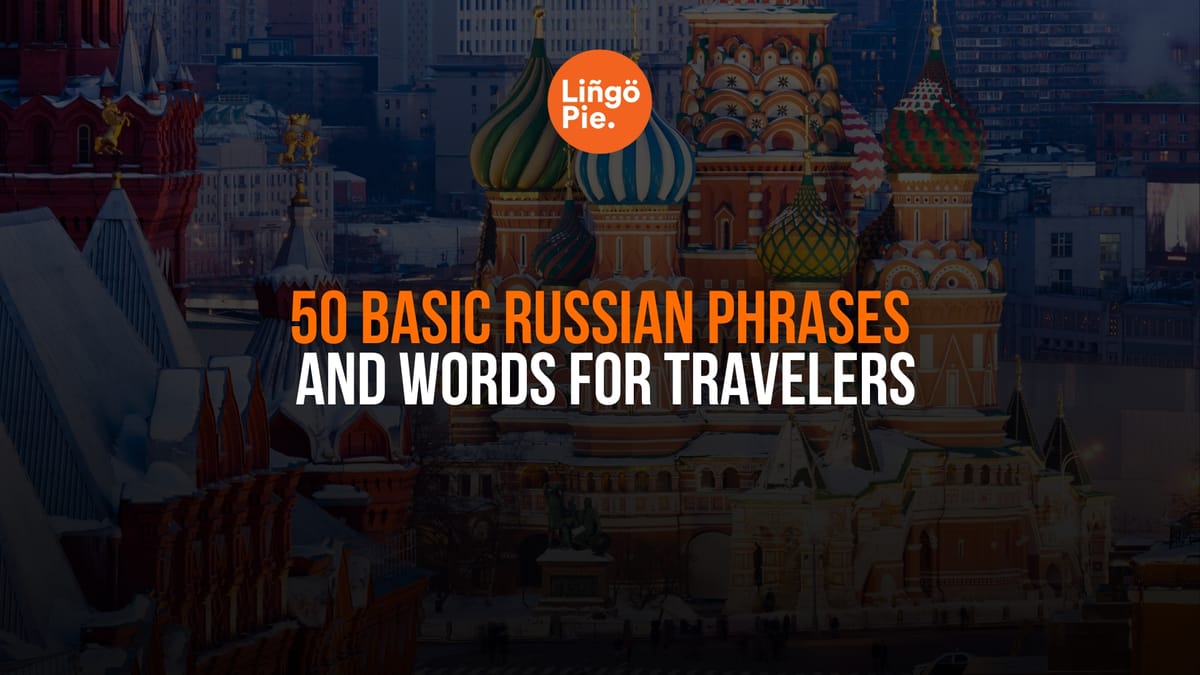Planning a trip to Russia but worried about the language barrier? As someone learning this language, I know for a fact that Russian can feel intimidating with its Cyrillic alphabet and complex grammar. However, you don't need to master the entire language to have meaningful interactions during your travels.
In celebration of the Russian Language Day happening on June 6th, allow me to share some of the best Russian phrases and words. Do note though that this guide covers 50 practical Russian phrases specifically chosen for travelers. Each phrase includes pronunciation guidance and cultural context to help you use them effectively during your next adventure.
- How To Learn Russian Fast: Easy Step-by-Step Guide
- 5 Best Russian Documentaries To Watch To Learn Russian
- 5 Best Russian Learning Websites You Should Try

Why Learn Russian When Some People Speak English?
While it's true that English has gained popularity in Russia, especially among younger generations and in major cities. In Moscow and St. Petersburg's tourist districts, you'll find English-speaking staff at international hotels, popular restaurants, and major attractions. Many Russians under 30 have studied English and can handle basic conversations.
However, this represents a small fraction of the population and is concentrated in very specific locations. Local restaurants, public transportation, smaller shops, and government offices primarily use Russian. In smaller cities and rural regions, finding English speakers is nearly impossible.

Essential Greetings and Politeness
Unlike many Western cultures, Russians tend to be more reserved with strangers but incredibly warm once you've made an effort to connect respectfully. Showing basic courtesy through proper greetings often determines whether you'll receive helpful assistance or polite but distant service.
Привет (Privet) - Hello (Informal)
This is your go-to greeting with friends, people your age, or in casual situations. Think of it as the Russian equivalent of "hey" or "hi."
Здравствуйте (Zdravstvuyte) - Hello (Formal)
Use this when meeting someone for the first time, addressing elders, or in business situations. It literally means "be healthy," showing the cultural importance Russians place on well-being.
До свидания (Do svidaniya) - Goodbye
This formal farewell works in almost any situation and literally means "until we meet again." It's your safe bet when leaving restaurants, shops, or saying goodbye to new acquaintances. For casual situations with friends, you might hear "Пока" (Poka) instead.
Спасибо (Spasibo) - Thank you
One of the most common Russian travel phrases you can use in any situation, both formal and informal. Adding "большое" (bolshoye) makes it "thank you very much." Russians appreciate politeness, so use this liberally when receiving help, food, or services.
Пожалуйста (Pozhaluysta) - Please/You're welcome
This versatile word means both "please" and "you're welcome," making it incredibly useful for travelers. Use it when asking for something or responding to thanks. It's also what you'll hear when someone hands you your receipt or change.
6. Извините (Izvinite) - Excuse me/Sorry
Perfect for getting someone's attention, apologizing for bumping into someone on the metro, or when you need to squeeze past people. It's more formal than "Прости" (Prosti), which is used with friends.

Essential Numbers for Travel
Understanding Russian numbers is crucial for shopping, transportation, and daily interactions. Russian numbers follow a logical system where you combine basic numbers to create larger ones, similar to English.
Russian Numbers 1-10
- Один/Одна (Odin/Odna) - One (changes based on gender)
- Два/Две (Dva/Dve) - Two (masculine/feminine forms)
- Три (Tri) - Three
- Четыре (Chetyre) - Four
- Пять (Pyat') - Five
- Шесть (Shest') - Six
- Семь (Sem') - Seven
- Восемь (Vosem') - Eight
- Девять (Devyat') - Nine
- Десять (Desyat') - Ten
The first two numbers change their endings based on the gender of the noun that follows—masculine uses the standard form, while feminine uses the alternative ending. This might seem complex, but in practical travel situations, people will understand you regardless of which form you use.

Important Larger Numbers In Russian
- Двадцать (Dvadtsat') - Twenty
- Сто (Sto) - One hundred
- Тысяча (Tysyacha) - One thousand
From twenty onwards, Russian numbers work similarly to English—you simply add the numbers 1-9 to the tens. For example, 21 is "двадцать один" (dvadtsat' odin). These numbers will help you understand prices, addresses, and time.

Navigation and Transportation
Russia's transportation infrastructure spans the world's largest country, featuring everything from Moscow's ornate metro stations (often called underground palaces) to the legendary Trans-Siberian Railway.
Где? (Gde?) - Where?
This simple question word opens doors to finding anything you need. Combine it with pointing or showing pictures on your phone when other words fail. Russians are generally helpful to lost-looking tourists, especially if you're making an effort to speak their language.
Где метро? (Gde metro?) - Where is the metro?
The metro system in Russian cities like Moscow and St. Petersburg is not only efficient transportation but also an underground museum with stunning architecture. This phrase will help you find these beautiful subway stations. Most major cities have excellent public transport that's much cheaper than taxis.
Автобус (Avtobus) - Bus
Russian buses connect cities and rural areas where trains don't reach. The word sounds similar to English, making it easy to remember. Public buses are an affordable way to see the countryside and interact with locals.
Поезд (Poyezd) - Train
Russia's extensive railway network, including the famous Trans-Siberian Railway, makes train travel popular and practical. Trains range from basic to luxury, and longer journeys often include meals and sleeping compartments. Learning this word helps you navigate train stations and read signs.
Такси (Taksi) - Taxi
While the word sounds like English, be careful about unofficial taxis that might overcharge tourists. Use official taxi apps or ask your hotel to call one. Always agree on the price beforehand or ensure the meter is running.
Аэропорт (Aeroport) - Airport
Essential for arrival and departure, this word will help you ask for directions or understand announcements. Russian airports have improved significantly in recent years, with better English signage, but knowing this word still proves helpful.
Food and Dining
If you're ready to order authentic Russian dishes and navigate local restaurants, use the phrases below to enhance your culinary adventures.
Ресторан (Restoran) - Restaurant
Russian cuisine offers much more than vodka and caviar—try hearty soups, fresh salads, and grilled meats. Many restaurants have English menus in tourist areas, but smaller, authentic places often don't. Knowing basic food vocabulary helps you discover hidden culinary gems.
Меню (Menyu) - Menu
This word will help you request a menu when it's not automatically provided. In some traditional restaurants, menus might only be in Russian, so pointing and using translation apps becomes helpful. Don't hesitate to ask servers for recommendations.
Счёт (Schet) - Bill/Check
Use "Дайте счёт, пожалуйста" (Dayte schet, pozhaluysta) to politely ask for the bill. Tipping isn't mandatory in Russia but is appreciated for good service—usually 10% is sufficient. Some restaurants add a service charge automatically.
Вода (Voda) - Water
Essential for staying hydrated, especially during long train journeys or summer walking tours. Tap water is generally safe in major cities, but bottled water is widely available and inexpensive. Most restaurants serve water upon request.
Хлеб (Khleb) - Bread
Bread is a staple of Russian meals and often comes automatically with your order. Russian bread varieties are delicious—from dark rye to sweet breakfast breads. This word helps you understand what's being offered or request more.

Shopping and Money
Сколько это стоит? (Skol'ko eto stoit?) - How much does this cost?
This essential shopping phrase works in markets, stores, and when bargaining is appropriate. Prices are usually fixed in shops, but outdoor markets sometimes allow for gentle negotiation. Having this phrase ready helps you budget and compare prices.
Рубль (Rubl') - Ruble
Russia's currency comes in both coins and colorful banknotes featuring Russian cities. Understanding prices and having basic number knowledge helps you avoid confusion when shopping or paying for services. Keep small bills handy for public transport and market purchases.
Карта (Karta) - Card
Credit cards are widely accepted in cities, but smaller establishments might prefer cash. This word helps you ask if card payment is possible. Always carry some cash for emergencies, especially when traveling outside major urban areas.
Касса (Kassa) - Cashier/Checkout
In Russian stores, you might need to find the designated checkout area rather than paying wherever you are. Supermarkets operate similarly to Western stores, but smaller shops might have different systems. This word helps you locate where to pay.
Магазин (Magazin) - Store/Shop
This general term for shop helps you ask for directions to stores or understand what type of establishment you're entering. Russian shops range from tiny convenience stores to massive shopping centers. Department stores often have multiple floors with different product categories.

Emergency and Important Situations
Помощь (Pomoshch') - Help
In emergencies, Russia uses different numbers depending on whether you're calling from a mobile phone (112, 101, 102, 103) or a fixed phone (01, 02, 03). Knowing how to ask for help in Russian can be crucial, though emergency operators in major cities often speak some English.
Больница (Bol'nitsa) - Hospital
Emergency medical aid in Russia is absolutely free regardless of your citizenship, but having valid travel insurance is required for entry. In major cities, some hospitals have English-speaking staff, but knowing this word helps in urgent situations.
Полиция (Politsiya) - Police
Hopefully you won't need this, but it's important to know. Police officers have the right to detain you for up to 48 hours, and you're entitled to contact your embassy if needed. Most interactions involve simple document checks, especially near tourist areas.
Врач (Vrach) - Doctor
For non-emergency medical needs, this word helps you find healthcare. Many pharmacies have basic medications available without prescriptions, and pharmacists often speak some English. Tourist areas usually have clinics familiar with foreign visitors.
Посольство (Posol'stvo) - Embassy
You have the right to contact your embassy or consulate if you encounter serious problems, and asking for this contact is your legal right. Keep embassy contact information easily accessible on your phone. Most embassies provide emergency services for their citizens abroad.

Accommodation
Гостиница (Gostinitsa) - Hotel
Russian hotels range from budget hostels to luxury palaces, especially in St. Petersburg and Moscow. Many international chains operate in major cities, but local hotels often provide more authentic experiences. Staff in tourist areas usually speak some English.
Комната (Komnata) - Room
Useful when discussing accommodations or asking about room availability. In homestays or smaller establishments, this word helps clarify what type of space you're renting. Room standards can vary significantly, so asking to see the room first is common practice.
Ключ (Klyuch) - Key
Modern hotels often use key cards, but smaller establishments might still use traditional keys. Some places require you to leave your key at reception when going out. This word helps you communicate about room access issues.
Завтрак (Zavtrak) - Breakfast
Many Russian accommodations include breakfast, which typically features bread, eggs, cheese, and tea or coffee. Asking about breakfast helps you plan your morning routine. Traditional Russian breakfast foods are hearty and designed to fuel you for the day ahead.

Final Essential Phrases
Я не понимаю (Ya ne ponimayu) - I don't understand
This honest phrase is incredibly useful when conversations become too complex. Russians appreciate honesty about language barriers and will often slow down, use simpler words, or find alternative ways to communicate. Don't feel embarrassed about using this phrase frequently.
Говорите медленнее (Govorite medlennee) - Speak slower, please
When someone is speaking too fast, this polite request often helps. Russians speak quickly in casual conversation, but most people are happy to adjust their pace for foreign visitors. Combine this with gestures and pointing to enhance understanding.
Как дела? (Kak dela?) - How are things?
This casual greeting is perfect for people you've met before or friendly interactions. It's more personal than formal greetings and shows you're interested in genuine conversation. Russians appreciate when foreigners make efforts to connect personally.
Очень хорошо (Ochen' khorosho) - Very good
Use this positive response when things are going well or to express satisfaction with service. Russians appreciate enthusiasm and positive attitudes from visitors. This phrase works for describing food, experiences, or your general state.
Да (Da) - Yes
Simple but essential for confirming understanding, agreeing to suggestions, or answering questions. Combined with nodding, this helps in situations where complex conversation isn't possible. Russians often use emphatic "да, да" to show strong agreement.
Нет (Net) - No
You can make refusals more polite by adding "Нет, спасибо" (Net, spasibo) meaning "No, thank you." This works for declining offers, refusing services, or clarifying misunderstandings. Being able to clearly say no helps avoid unwanted purchases or services.
Ready to Explore Russia?
These 50 phrases give you everything you need for a successful trip to Russia. Russians appreciate when visitors make an effort to speak their language, so don't worry about perfect pronunciation. Just try your best and you'll get warm responses!
If you want to go beyond basic travel phrases, check out Lingopie. You can learn Russian through hit movies and TV shows with interactive subtitles, making it easy to build real conversational skills for your next adventure.






![Are You A Gabacho, Gringo, Or Güero? [Spanish Slang Guide]](/blog/content/images/size/w1200/2025/06/Gabacho-Meaning.jpg)
![Russian Alphabet: Everything You Need to Know [2025]](/blog/content/images/size/w300/2025/04/Russian-alphabet-.jpg)


